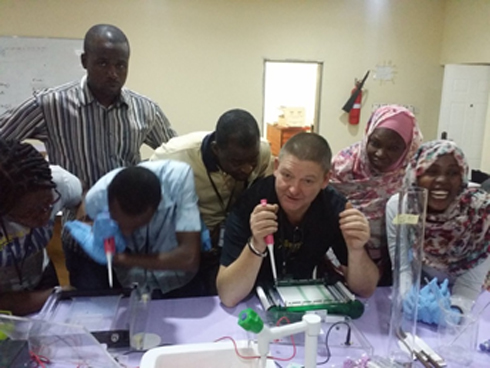Cambridge Science Festival, March 2017
Members of the Department made considerable contributions to the Science Festival
FameLab
Tessa Bertozzi, also participated in FameLab as part of the Science Festival. Famelab is '... a communications competition designed to engage and entertain by breaking down science, technology and engineering concepts into three minute presentations.' No Powerpoint slides are allowed, only props you can carry onto the stage yourself. While any scientific concept is valid, talking about one’s own research is encouraged. The judges decide on the winner based on three criteria: content, clarity, and charisma.
The first round took place at The Portland Arms in February, where Tessa explained what jumping genes were, using velcro and cardboard.
The final took place at the Cambridge Junction on 15 March, where Ithis time Tessa attempted to give the audience a general understanding of epigenetics using pipe cleaners and stuffed colourful mice.
Tessa's Final talk can be viewed here:
Ely Cathedral Science Festival
On 07 June 2017, Dr David Summers presented a lecture titled ‘What Darwin didn’t know…’ at the Ely Cathedral Science Festival.
Charles Darwin published 'On the origin of Species' in 1859. This seminal text changed science for ever and completely changed our understanding of the natural world. But there are some things Darwin didn't know or understand at the time which are potentially even more earth shattering. David Summers ran through the through the history of genetics.
Insight Outreach Programme
Alexandre Leitao and Arun Ramesh developed an activity for a University widening participation event. This involved Year 9 – 11 students being shown an introduction to fly tools used in the lab and experiments.
This was a morning with approximately 20 students where we started with a brief introduction on fly tools used in the lab (fluorescence and genome recombination) and then we had two blocks of experimentation. One block checked fluorescent drosophila lines and understand why are they so important/practical. The other checked 'classical' phenotypic mutations and understand their use in finding the location of unknown mutations.
During the experimentation students were encouraged to use the microscopes, describe what they were seeing and discuss the results.
TReND Insect Neuroscience School

This is the second year Professor Steve Russell has been involved in the TReND outreach programme. The course, run by a voluntary organisation, is designed to provide intensive training in advanced insect genetics and neuroscience to young Africans and this year the school hosted 18 students from 7 different African countries. In the first week, Stefan Koestler and Steve Russell delivered lectures and practical sessions on introductory molecular biology and advanced Drosophila genetics. Steve also delivered a lecture on genetic control strategies for malaria control, based on work from the Target Malaria consortium that he is a member of, followed by a group discussion session on the issue of genetic control of mosquito populations for malaria.
